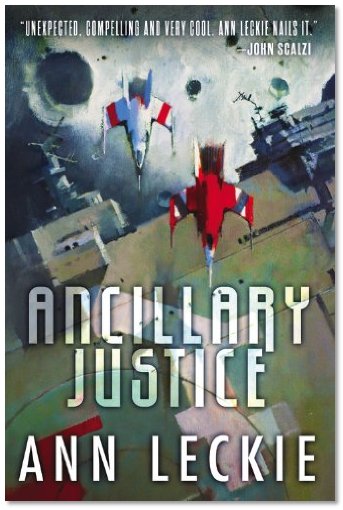
21 years ago, also in which much of the action is on an ice planet, featuring "characters" of gender

fluidity or neutrality, by another writer of above-average talent, Nicola Griffith's Ammonite (1992). Both writers and their books are very smart.
What do I mean by this?
For starters, at this particularly moment, particularly in the mystery/thriller/suspense/police procedural genres, the extremely cold parts of our planet are of great interest, i.e. "nordic noir." The latest entry into this subgenre that began rolling with the popularity of Sweden's Kurt Wallender series (both in print and as two television series -- one on Swedish tv and the other on English television starring Kenneth Branaugh) is Fortitude, where a murder is committed in small town professional scientific community in the Arctic.
The second thing I mean is how Leckie handles gender. In Justice, what is masculine and feminine, or he or she, slides all over the place There are no other markers in the for male or female than pronouns, and those pronouns seem to have quite other significance than sexual identification. The unmarking of gender as identification for sex or hierarchy is of great interest in current sf/f.
The third smart thing is that Justice is space opera. Publishers and readers alike have been wanting updated space opera for a while now, upgraded to a more current reflection of "The Way We Live Now" than the by now quaint treatment of ST and the racist, sexist Firefly, which underneath, whether or not Whedon realized that's what he was doing, celebrates the slaveocracy rebels of the War of Southern Rebellion (1861 - 1865).
But what is smartest of all about Justice, is that it doesn't come across as smart. By that I don't mean comes across as dumb, because it doesn't. What I mean is that the text reads so elegantly in composition and organization, that all these elements are effortlessly there, and centered, while there's a strong plot that, like all stories are supposed to do, pulls the reader along to find out what will happen next. It doesn't draw attention to how smart it is at all. Instead we simply experience the pleasure of its smartness.
If I had a criticism to make of Ancillary Justice it would be that Orbit, the publisher, gave it an unattractive cover. Indeed, the cover may be what has kept me away from the book for so long. The cover's elements are clunky and clumsy, colored with muddy grey and green tones. The cover as depicted in the photo above is of much sharper resolution and clarity of tone than on the book on my desk.

The Silkworm is the second novel featuring private investigator and Afghan war vet, Cormoran Strike, by Robert Galbraith. I didn't actually read it, but listened to it via library audio download during my workouts. The Silkworm's case is set in the publishing industry.
We encounter several novelists and editors and publishing companies, an agent or two. What is interesting to me about this is, as per usual in fiction, and I suppose naturally so, publishing as depicted in the novel is only concerned with novels -- whereas in reality, most of the publishing industry is not fiction, and profits from all forms of fiction are falling. There are a few exceptions to this, and the author of this series, who, as we all know Roberta, is in reality J.K. Rowling, is a mighty exception.
I'm not liking this second Cormoran Strike investigation as much as I did the first one. It feels more like a dutiful fill in the formula blanks for the genre, than the fresh delight that seemed to come through about everything in the first one, The Cuckoo's Calling, from entering extreme high end restaurants and boutiques who cater to the very prosperous, to packs of ravening paparazzi. This delight in exploring the new, distilling the author's own experiences of entering the world of private cars and drivers, hair stylists and designers, the deference and perks with which the celebrated are received everywhere, covered a lot of the clumsiness of composition.
This second time around, not so much, particularly the habit of preceding each chapter with a quotation from plays, mostly out of the Jacobean era of English drama. No more than the Latin quotations at the head of each chapter of Cuckoo's Calling, do these quotes seem to illuminate either character or action, or do only occasionally. They feel irrelevant, because Cormoran Strike, our protagonist, doesn't have knowledge of either Latin or the history of English literature, and certainly doesn't give a damn about either one. The epigraphs are tacked on decorations rather than integrated, graceful ornaments. Whether or not this was the author's intention, their function seems to be reader reminders that Galbraith is really Rowling, who is educated and smart. This kind of error in presentation she never made in the Harry Potter series.
I probably won't be reading any more Cormoran Strike books. But I will read Leckie's second, Ancillary Sword -- though when I don't know, so much work, so many projects are stacking up. Maybe on the plane to NO for the Caribbean Conference at the end of the month?

No comments:
Post a Comment